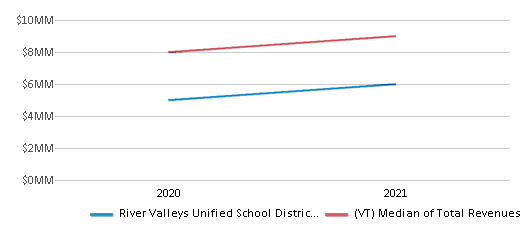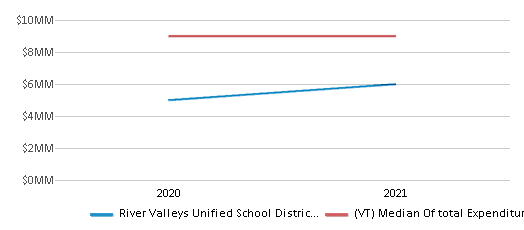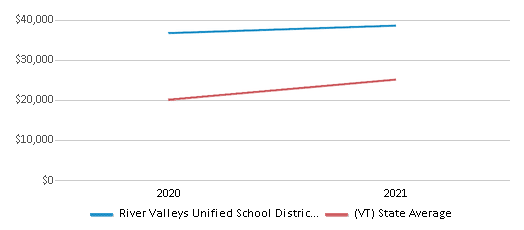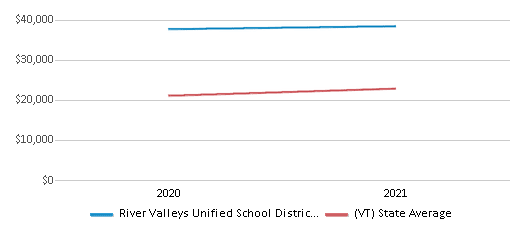Top Rankings
River Valleys Unified School District #73 ranks among the top 20% of public school district in Vermont for:
Category
Attribute
Overall Rank
Highest overall rank (Top 5%)
Math Proficiency
Highest math proficiency (Top 5%)
Reading/Language Arts Proficiency
Highest reading/language arts proficiency (Top 10%)
For the 2025 school year, there are 2 public schools serving 136 students in River Valleys Unified School District #73. This district's average testing ranking is 10/10, which is in the top 5% of public schools in Vermont.
Public Schools in River Valleys Unified School District #73 have an average math proficiency score of 53% (versus the Vermont public school average of 33%), and reading proficiency score of 60% (versus the 44% statewide average).
Minority enrollment is 6% of the student body (majority Hispanic), which is less than the Vermont public school average of 13% (majority Hispanic and Black).
Overview
This School District
This State (VT)
# Schools
2 Schools
306 Schools
# Students
136 Students
78,642 Students
# Teachers
12 Teachers
7,167 Teachers
Student : Teacher Ratio
11:1
11:1
District Rank
River Valleys Unified School District #73, which is ranked within the top 5% of all 102 school districts in Vermont (based off of combined math and reading proficiency testing data) for the 2021-2022 school year.
Overall District Rank
#4 out of 154 school districts
(Top 5%)
(Top 5%)
Math Test Scores (% Proficient)
53%
33%
Reading/Language Arts Test Scores (% Proficient)
60%
44%
Students by Ethnicity:
Diversity Score
0.11
0.23
# American Indian Students
n/a
202 Students
% American Indian Students
n/a
n/a
# Asian Students
1 Student
1,604 Students
% Asian Students
1%
2%
# Hispanic Students
5 Students
2,652 Students
% Hispanic Students
4%
3%
# Black Students
2 Students
2,114 Students
% Black Students
1%
3%
# White Students
128 Students
68,754 Students
% White Students
94%
88%
# Hawaiian Students
n/a
56 Students
% Hawaiian Students
n/a
n/a
# Two or more races Students
n/a
3,304 Students
% of Two or more races Students
n/a
4%
Students by Grade:
# Students in PK Grade:
26
8,002
# Students in K Grade:
16
5,145
# Students in 1st Grade:
18
5,342
# Students in 2nd Grade:
20
5,706
# Students in 3rd Grade:
13
5,327
# Students in 4th Grade:
14
5,812
# Students in 5th Grade:
17
5,556
# Students in 6th Grade:
12
5,670
# Students in 7th Grade:
-
5,534
# Students in 8th Grade:
-
5,596
# Students in 9th Grade:
-
5,400
# Students in 10th Grade:
-
5,537
# Students in 11th Grade:
-
5,331
# Students in 12th Grade:
-
4,684
# Ungraded Students:
-
-
District Revenue and Spending
The revenue/student of $43,750 is higher than the state median of $29,860. The school district revenue/student has grown by 13% over four school years.
The school district's spending/student of $43,588 is higher than the state median of $29,121. The school district spending/student has grown by 13% over four school years.
Total Revenue
$6 MM
$2,348 MM

Spending
$6 MM
$2,290 MM

Revenue / Student
$43,750
$29,860

Spending / Student
$43,588
$29,121

Best River Valleys Unified School District #73 Public Schools (2025)
School
(Math and Reading Proficiency)
(Math and Reading Proficiency)
Location
Grades
Students
Rank: #11.
Wardsboro Central School
(Math: 40-59% | Reading: 60-79%)
Rank:
Rank:
10/
Top 10%10
70 School Road
Wardsboro, VT 05355
(802) 896-6210
Wardsboro, VT 05355
(802) 896-6210
Grades: PK-6
| 46 students
Rank: #22.
Dover Elementary School
(Math: 50-59% | Reading: 50-59%)
Rank:
Rank:
9/
Top 20%10
9 Schoolhouse Road
East Dover, VT 05341
(802) 464-5386
East Dover, VT 05341
(802) 464-5386
Grades: PK-6
| 90 students
Frequently Asked Questions
How many schools belong to River Valleys Unified School District #73?
River Valleys Unified School District #73 manages 2 public schools serving 136 students.
What is the rank of River Valleys Unified School District #73?
River Valleys Unified School District #73 is ranked #3 out of 102 school districts in Vermont (top 5%) based off of combined math and reading proficiency testing data for the 2021-2022 school year. This district ranks in the top 20% of Vermont school districts for: Highest overall rank (Top 5%), Highest math proficiency (Top 5%) and Highest reading/language arts proficiency (Top 10%)
What is the racial composition of students in River Valleys Unified School District #73?
94% of River Valleys Unified School District #73 students are White, 4% of students are Hispanic, 1% of students are Asian, and 1% of students are Black.
What is the student/teacher ratio of River Valleys Unified School District #73?
River Valleys Unified School District #73 has a student/teacher ratio of 11:1, which is equal to the Vermont state average of 11:1.
What is River Valleys Unified School District #73's spending/student ratio?
The school district's spending/student of $43,588 is higher than the state median of $29,121. The school district spending/student has grown by 13% over four school years.
Recent Articles

Year-Round Or Traditional Schedule?
Which is more appropriate for your child? A year-round attendance schedule or traditional schedule? We look at the pros and cons.

Why You Should Encourage Your Child to Join a Sports Team
Participating in team sports has a great many benefits for children, there is no doubt. In this article you will learn what those benefits are.

White Students are Now the Minority in U.S. Public Schools
Increasing birth rates among immigrant families from Asia and Central and South America, combined with lower birth rates among white families, means that for the first time in history, public school students in the United States are majority-minority. This shift in demographics poses difficulties for schools as they work to accommodate children of varying language abilities and socio-economic backgrounds.





